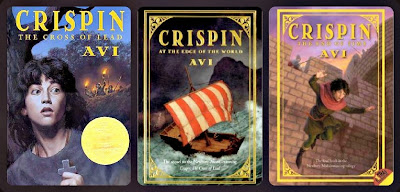Book Review: The Crispin Series
"What kind of men -- I wondered -- were these that killed by day, drank by night, but prayed each morning?"
“The more men see of the world, the bigger their hearts."
This week, I did my phlebotomy rotation. I got the veins the majority of the time, and only had one pass-out (which, I found out, was why the blood draw was happening anyways, so I'm not even convinced it was my fault). But, I also got to finish some more books.
I read the first of the Crispin books, Crispin: The Cross of Lead, a long, long time ago. Back when it won the Newbery Award. By the way, it was approximately a month ago that I learned that Newbery in Newbery Award only has one r. Look it up. It's true. Anyways, I really liked the book then. My mother thought it was "okay."
I didn't quite understand why she would only say "okay." I kind of understand now. I didn't reread Cross of Lead, but I did read At the Edge of the World and The End of Time. I must say, I was not as impressed. The books are about Crispin, a 13-year-old boy living in England in the 1370s. I already spoiled something, because at the beginning of the first book, he is only known as Asta's son and doesn't have a name. However, I think we all know that he's Crispin, since it's in huge letters on the front of the book. I even knew that as a child.
So, they're written by Avi, and I've always had mixed feelings about his books. In these books, the biggest problem, in my mind, is that they are only minimally researched. If you're going to set something in the 1370s, you need to either thoroughly research the 1370s, or just "time adjust" the whole thing. You can't call upon saints, see those with cleft palates as devil-children and use the word "speaketh" at times, and then impose modern logic and mental constructs on the story at other times. And though people in the story see those with birth-defects as Satan-spawn, they have no problem with the fact that Crispin is illegitimate.
Also, the characters are cardboard flat, with blatant attempts to give them depth failing miserably. The plots are shallow and gimmicky, and try to infuse medieval life into them, without much success.
What I can say is that these are great books for kids to get interested in the medieval world without thinking that all of the medieval world was knights and fair ladies. Avi wanted to make a story about peasants, and he did it. I credit him with the fact that it doesn't start peasant and then turn out that they somehow end up jousting in a tournament. It was a new spin on the medieval story.
The second one was the worst--just so hard to get through. But overall, I think I can comfortably give 3 stars. Kids might enjoy them, but it's not "children's literature" in the sense that it's stories written for children that will stay with them forever and still be loved as an adult.


Comments